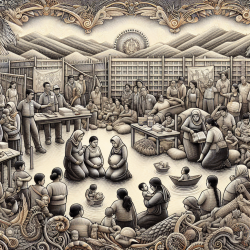Understanding the Impact of ICE Policies on Pregnant Migrant Latinas
In the realm of social work and child development, understanding the broader socio-political context is crucial for creating effective interventions. A recent policy analysis titled "Pregnant Migrant Latinas at the US Border: A Reproductive Justice Informed Analysis of ICE Health Service Policy During 'Zero-Tolerance'" sheds light on the significant impact of immigration policies on pregnant migrant Latinas. This blog aims to explore the implications of these findings for practitioners and encourage further research in this critical area.
The ICE Directive and Its Consequences
The research highlights the ICE Directive 11032.3, which revoked the automatic release of pregnant women detained by ICE during the Trump Administration's "zero-tolerance" policy. This policy led to the criminalization, family separation, and detention of Latin American migrants seeking asylum in the USA. The analysis uses a reproductive justice framework to highlight the violations of reproductive and human rights experienced by pregnant migrant Latinas.
Key Findings and Implications
- The policy did not deter migration but instead created avoidable harm to pregnant Latinas.
- Case studies demonstrated inadequate healthcare and human rights violations in ICE detention centers.
- Reproductive justice as a framework highlights the need for policies that respect the rights and healthcare needs of migrant women.
Improving Practitioner Skills
For practitioners working with children and families, this research underscores the importance of understanding the broader socio-political context affecting clients. By integrating a reproductive justice framework into practice, social workers can better advocate for the rights and needs of migrant families. This involves:
- Engaging in policy advocacy to support humane immigration practices.
- Collaborating with interdisciplinary teams to provide comprehensive care to migrant families.
- Educating oneself on the intersectionality of immigration, reproductive rights, and social justice.
Encouraging Further Research
While the research provides a foundational understanding of the impact of ICE policies, further studies are needed to explore the long-term effects on children and families. Practitioners are encouraged to engage in research initiatives that focus on the outcomes of children affected by these policies, contributing to data-driven decision-making in social work practice.
To read the original research paper, please follow this link: Pregnant Migrant Latinas at the US Border: A Reproductive Justice Informed Analysis of ICE Health Service Policy During “Zero-Tolerance”.










